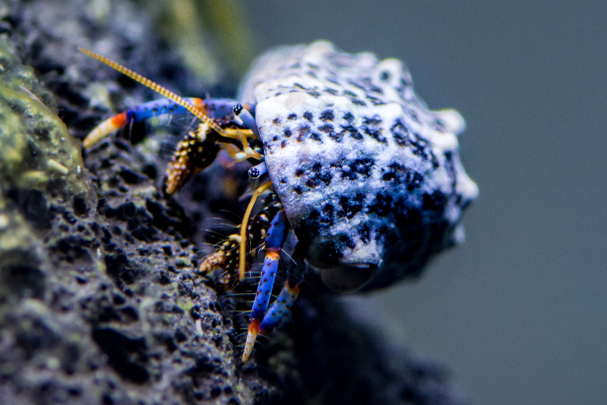Top Care Facts For The Blue Leg Reef Hermit Crab (Clibanarius tricolor)
- Care Level: Easy
- Temperament: Peaceful
- Diet: Omnivore
- Origin: Western Atlantic
- Minimum Tank Size: 5 gallons
- Acclimation Time: 2+ hours
- Reef Safe: Yes
- Coral Safe: Yes
- Invertebrate Safe: Yes
- Lighting: ~
- Placement: ~
- Waterflow: ~
Approximate purchase size: Up to 1/2 inch
The Blueleg Hermit Crab is a very popular Hermit Crab that is very active in the home aquarium. Their legs are colored in brilliant blue, orange, and black. In the wild, these crabs live together in the hundreds clinging to rocks and each other, then search for food during low tides. They should be offered algae sheets on an every other day basis in order to help feed them. Most of their day is spent as scavengers and they do a tremendous job keeping aquariums clean of detritus and waste build-up. They are voracious algae eaters.
Crabs belong to the Class Crustacea and Order Decapoda. Hermits and Porcelain Crabs belong to Section Anomura, which consists of long antennae and three pairs of walking legs. The head of the Crab is connected to the thorax and covered by a shell called a carapace. They have a smaller abdomen and tail compared to Shrimp and they keep this tucked beneath the carapace. The first pair of their legs are usually developed claws which they use to gather food, use as protection, and to move objects. In order for Crabs to grow, they need to shed their exoskeleton, a process called “molting”, which allows them to remove their restricting shell and begin a new one. Often times in the home aquarium Crabs will leave this translucent shell in full view so it can serve as a distraction while the Crab finds a hiding place and allows its new shell to harden. Hermit Crabs use abandoned shells as their home. These Crabs usually have extended abdomens that they wrap around the inside of the spiraling shell leaving only their head and claws exposed. When approached these Crabs can recoil into the shell for protection. When a Hermit Crab grows it will often seek out a new larger shell.


Reviews
There are no reviews yet.